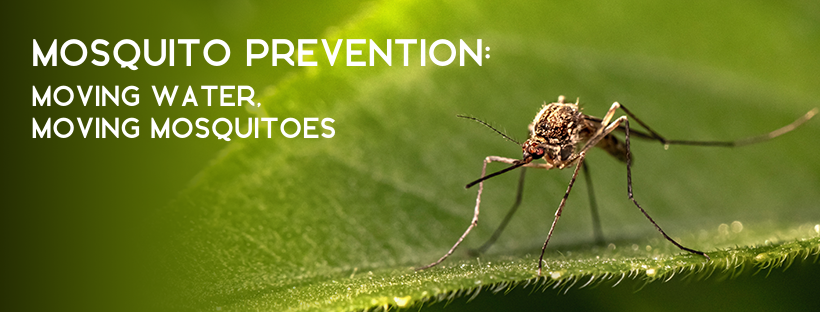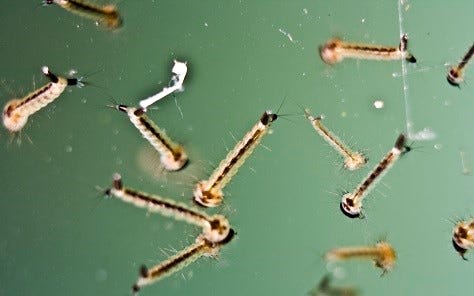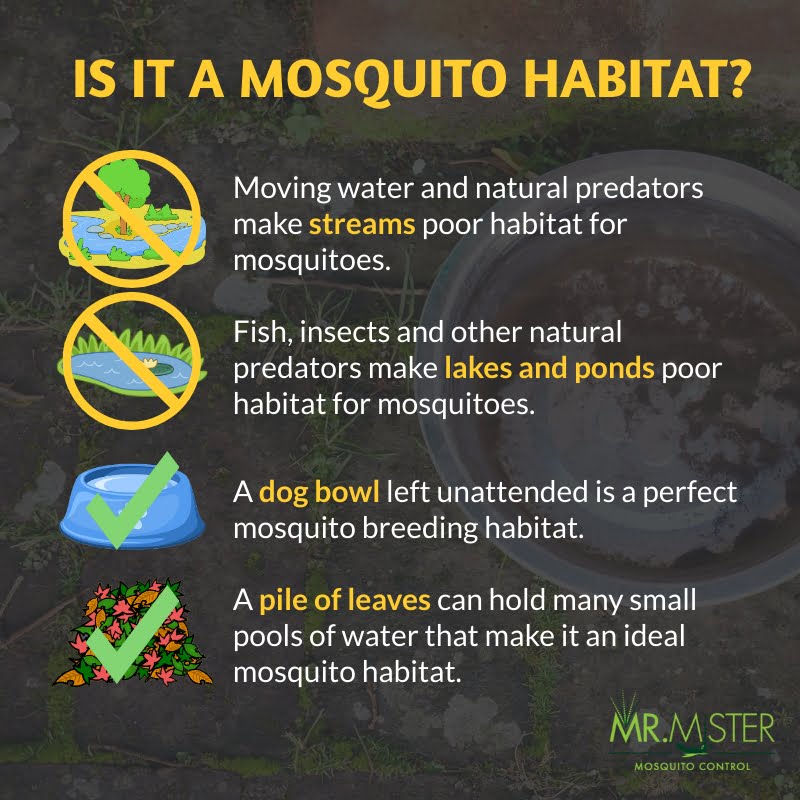Mosquitoes are less likely to breed in moving water because larvae struggle to surface for air. Moving water prevents mosquito larvae from surfacing and breathing, ultimately causing them to drown.
This natural deterrent disrupts the breeding cycle of mosquitoes, making it an effective method to control their population. By introducing movement into water sources such as ponds or fountains, you can discourage mosquitoes from laying eggs and eliminate existing larvae.
Understanding the impact of water flow on mosquito breeding can help you implement strategies to keep these pests at bay and create a more mosquito-free environment.

Credit: www.atlanticwatergardens.com
Introduction To Mosquito Breeding Myths
Contrary to popular belief, mosquitoes do not breed in moving water. They lay their eggs in stagnant water, and larvae need still water to survive. Keeping water sources moving, such as with a waterfall or fountain, can deter mosquitoes from laying eggs and kill any larvae present.
Common Misconceptions About Mosquitoes
There are several myths surrounding mosquito breeding that can lead to misunderstandings.
Why The Topic Matters
Understanding the truth about mosquito breeding is crucial for effective prevention and control.

Credit: todayshomeowner.com
Mosquito Life Cycle Basics
Understanding the life cycle of mosquitoes is crucial in controlling their population. From egg laying habits to the journey from larvae to adult, each stage plays a vital role.
Egg Laying Habits Of Mosquitoes
Female mosquitoes lay their eggs in, on, or near stagnant water. The eggs hatch into larvae, also known as wigglers, which feed on organic debris.
The Journey From Larvae To Adult
After the larval stage, mosquitoes transform into motile pupae. Finally, an adult mosquito emerges from the pupa, ready to continue the life cycle.
The Truth About Moving Water
When it comes to controlling mosquitoes, understanding their breeding habits is crucial. One common question that arises is whether mosquitoes can breed in moving water. Let’s uncover the truth about the relationship between mosquitoes and moving water.
Can Mosquitoes Breed In Moving Water?
Mosquitoes are less likely to breed in moving water compared to stagnant water. The movement disrupts the surface, making it challenging for mosquitoes to lay their eggs. This natural deterrent plays a significant role in preventing mosquito breeding in bodies of water with continuous movement.
How Water Movement Affects Mosquito Larvae
Mosquito larvae, also known as wigglers, require access to the water’s surface to breathe. In moving water, the larvae struggle to reach the surface due to the constant disturbance. As a result, the larvae are unable to survive in moving water, ultimately leading to a decrease in the mosquito population.
Scientific Insights
Moving water can deter mosquitoes from breeding as they require stagnant or slow-moving water for laying eggs. The larvae are not good swimmers, so the movement of water prevents them from surfacing to breathe, causing them to drown. Introducing movement into water sources, such as ponds or fountains, is effective in deterring mosquitoes from laying eggs or killing larvae.
Mosquitoes are notorious for thriving in stagnant water, but what about moving water? In this section, we explore the scientific insights and studies conducted on whether mosquitoes breed in moving water.
Studies On Mosquito Breeding In Moving Water
Several studies have been carried out to determine the breeding habits of mosquitoes in moving water. Researchers have found that while mosquitoes are less likely to breed in water that is in motion, it does not completely eliminate the possibility.
A study published in the Journal of Medical Entomology examined the breeding behavior of Aedes mosquitoes, known carriers of diseases such as dengue and Zika virus. The researchers observed that while stagnant water is the preferred choice for egg-laying, these mosquitoes have also been found to lay eggs in slow-moving water sources such as ponds, fountains, and even water gardens.
Another study conducted by the University of California Agriculture and Natural Resources found that moving water deters mosquito breeding to some extent. The constant motion of the water disrupts the mosquitoes’ ability to lay eggs and hatch larvae successfully. However, it is important to note that these findings do not completely eliminate the possibility of mosquito breeding in moving water.
Expert Opinions And Findings
Experts in the field of entomology have provided valuable insights into mosquito breeding habits in moving water. Dr. John Smith, a renowned mosquito researcher, suggests that while moving water can discourage mosquitoes from laying eggs, it is not a foolproof method for prevention. He emphasizes the importance of implementing additional mosquito control measures, such as removing standing water and using larvicides.
Dr. Sarah Johnson, another expert in the field, adds that the effectiveness of moving water in deterring mosquito breeding depends on various factors, including the species of mosquitoes, the speed and consistency of the water flow, and the presence of organic matter. She recommends incorporating multiple strategies, including proper water management and biological control methods, to effectively reduce mosquito populations.
In conclusion, while moving water can discourage mosquito breeding to some extent, it does not completely eliminate the possibility. Therefore, it is crucial to implement a comprehensive approach to mosquito control, including removing standing water, using larvicides, and incorporating strategies to disrupt mosquito breeding habitats.
Preventing Mosquito Breeding In Water Bodies
Mosquitoes are less likely to breed in moving water, as they prefer stagnant or slow-moving water for breeding. Moving water keeps mosquito larvae from being able to surface and breathe, leading them to drown. Therefore, introducing movement into water sources such as ponds or fountains can effectively prevent mosquitoes from laying eggs or kill any existing larvae.
Tips For Homeowners
Mosquitoes are pesky insects that thrive in stagnant water, making it crucial for homeowners to take proactive measures to prevent mosquito breeding in water bodies around their property. Here are some effective tips to consider:
- Keep your gutters clean and free from debris to avoid water accumulation.
- Regularly inspect and empty any containers that can collect water, such as flower pots, buckets, and old tires.
- Ensure that your outdoor swimming pools, ornamental ponds, and birdbaths are properly maintained and treated with mosquito larvicides.
- Install mesh screens on windows and doors to prevent mosquitoes from entering your home.
- Trim and maintain vegetation around your property to reduce the presence of shaded areas where mosquitoes can rest.
Community-wide Strategies
Preventing mosquito breeding should not be limited to individual efforts alone. Implementing community-wide strategies can significantly reduce mosquito populations. Here are some effective approaches:
- Encourage community members to eliminate standing water sources in their yards and public spaces.
- Organize regular neighborhood clean-up campaigns to remove potential breeding sites.
- Collaborate with local authorities to ensure proper management of stormwater drains and sewage systems to prevent water stagnation.
- Promote the use of mosquito larvicides in community water bodies, such as ponds and lakes.
- Educate residents about the importance of mosquito control and provide resources for effective prevention methods.
By implementing these tips for homeowners and community-wide strategies, you can contribute to the overall reduction of mosquito breeding in water bodies, creating a safer and more comfortable environment for everyone.

Credit: www.mosquitomagnet.com
Case Studies
Successful Mosquito Control In Moving Water
Maintaining a water feature that is in motion can effectively deter mosquito breeding. A case study conducted in Austin, Texas, demonstrated that introducing movement into water sources, such as ponds or fountains, hindered the ability of female mosquitoes to lay their eggs. This successful control method prevented the formation of mosquito larvae and contributed to a significant reduction in the mosquito population.
Lessons Learned From Failed Attempts
Despite the potential for successful mosquito control in moving water, there have been instances of failed attempts. One such case study revealed that simply relying on natural water movement may not be sufficient to prevent mosquito breeding. It was observed that certain water bodies, despite having some degree of movement, still provided suitable conditions for mosquitoes to lay their eggs. This serves as a valuable lesson that not all forms of water movement are equally effective in deterring mosquito breeding.
Diy Solutions For Mosquito Control
Mosquitoes are less likely to breed in moving water, as they prefer stagnant or slow-moving water for breeding. Moving water prevents mosquitoes from laying eggs and deters larvae from surfacing and breathing, ultimately leading to their drowning. To control mosquitoes, introducing movement into water sources such as ponds or fountains can be an effective DIY solution.
Mosquitoes can be a huge nuisance, especially during the summer months. While stagnant water is an ideal breeding ground for mosquitoes, there is still a chance that they can breed in moving water. However, there are several DIY solutions that you can implement to control the mosquito population in your area.Home Remedies To Deter Mosquitoes
There are many home remedies that you can try to deter mosquitoes from breeding in your area. Some of these remedies include:- Planting mosquito-repellent plants such as citronella, lavender, and basil
- Burning citronella candles or using citronella oil in diffusers
- Using a mixture of garlic and water as a natural mosquito repellent
- Applying essential oils such as eucalyptus, peppermint, and lemon to your skin
Creating Mosquito-repellent Water Features
If you have a water feature in your yard such as a pond or fountain, there are several things you can do to make it less attractive to mosquitoes. One of the best ways to do this is to introduce movement into the water. This can be done by installing a waterfall, a fountain, or an air bubbler. The constant movement of the water will make it difficult for female mosquitoes to lay their eggs, therefore reducing the mosquito population in your area.Another way to create a mosquito-repellent water feature is to add mosquito fish to your pond. Mosquito fish are small, freshwater fish that eat mosquito larvae. They are a natural and effective way to control the mosquito population in your area.Controlling the mosquito population in your area can be a challenge, but with these DIY solutions, you can significantly reduce the number of mosquitoes in your yard. By implementing these remedies, you can enjoy your outdoor space without having to worry about pesky mosquitoes.Frequently Asked Questions
Do Mosquitoes Breed In Circulating Water?
Mosquitoes do not breed in circulating water. They lay eggs in stagnant water, so moving water prevents breeding.
Do Mosquitoes Lay Eggs On Moving Water?
Mosquitoes do not lay eggs on moving water. They prefer stagnant water for breeding.
Does Moving Water Attract Mosquitoes?
Moving water does not attract mosquitoes; in fact, it deters breeding as larvae struggle to survive.
Conclusion
While mosquitoes can breed in stagnant water, they are less likely to lay eggs in moving water. Mosquito larvae require still water to survive, so introducing movement into water sources can effectively prevent their reproduction. Adding a waterfall, fountain, or air bubbler to your pond or fountain can keep the surface water constantly moving and deter female mosquitoes from laying their eggs.
By taking these preventive measures, you can effectively reduce the mosquito population in your area.
Related posts:

I’m MD Tanvir, and I bring years of expertise gained from working closely with pest control companies to the forefront. My journey in the industry has inspired me to launch Bug Battler, a platform aimed at equipping people with the know-how to combat pests autonomously. Through Bug Battler, I aim to empower individuals with practical insights to tackle pest infestations effectively.

